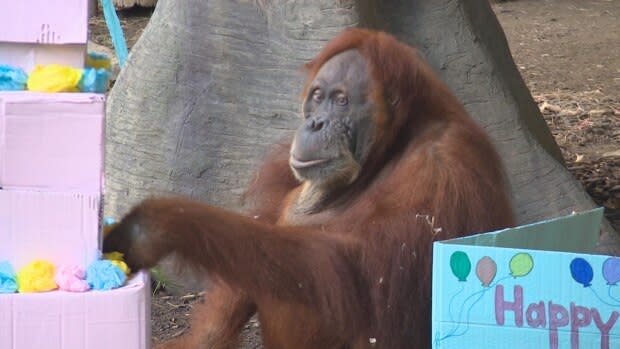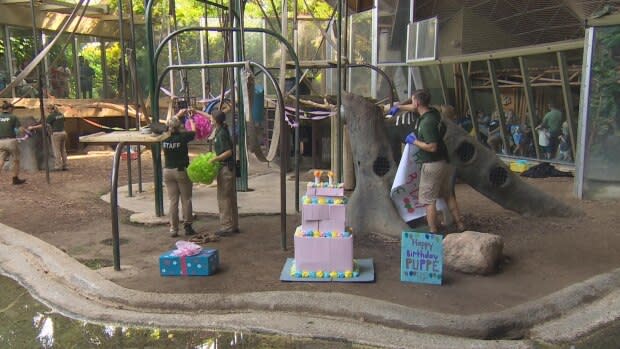Puppe, the Toronto Zoo's Sumatran orangutan, celebrates her 52nd birthday
One of the Toronto Zoo's oldest and most popular animals is "celebrating" her 52nd birthday this weekend.
Puppe, a Sumatran orangutan who has lived at the zoo since it first opened in 1974, was feted with food, toys and a birthday card in front of onlookers Saturday morning.
At 52, she is the second-oldest Sumatran orangutan living in North America.
"I think she's a pretty iconic species here, she's been here since the zoo opened, so that's very special for us," said zookeeper Amanda Carroll, one of Puppe's caretakers.
Since Puppe was born in the wild, her true birthday is unknown. The zoo celebrates the occasion twice a year, once in January and again in September, the month she arrived in Toronto.

During her 45 years at the zoo, Puppe has given birth to five offspring. The great ape is also a grandparent of four.
She is one of six orangutans at the zoo, and the only one not born in captivity.
Her birthday gifts included popcorn, peanuts, sunflower seeds, essential oils and plastic balls, which Puppe enjoys rolling between her fingers.
Life in captivity
While zoos and aquariums have been under increased scrutiny in recent years due to concerns about animal welfare, the Toronto Zoo insists that Puppe's living conditions far exceed those experienced by wild orangutans.
The species is considered critically endangered by the International Union for Conservation of Nature.
Its native habitat on the Indonesian island of Sumatra is under threat of deforestation largely due to the palm oil industry.
Carroll said Puppe's wild cousins are suffering from starvation and being shot by humans after they are forced to seek food on people's crops.

"Their life in the wild is horrific," she said. "This is a population that we are saving in captivity so that if they do go extinct in the wild we do have this backup."
If the orangutan's native habitat is restored or improved, Carroll said it is possible that some captive apes could be reintroduced to their original home.
"We are working on the possibility of returning them to the wild one day."


